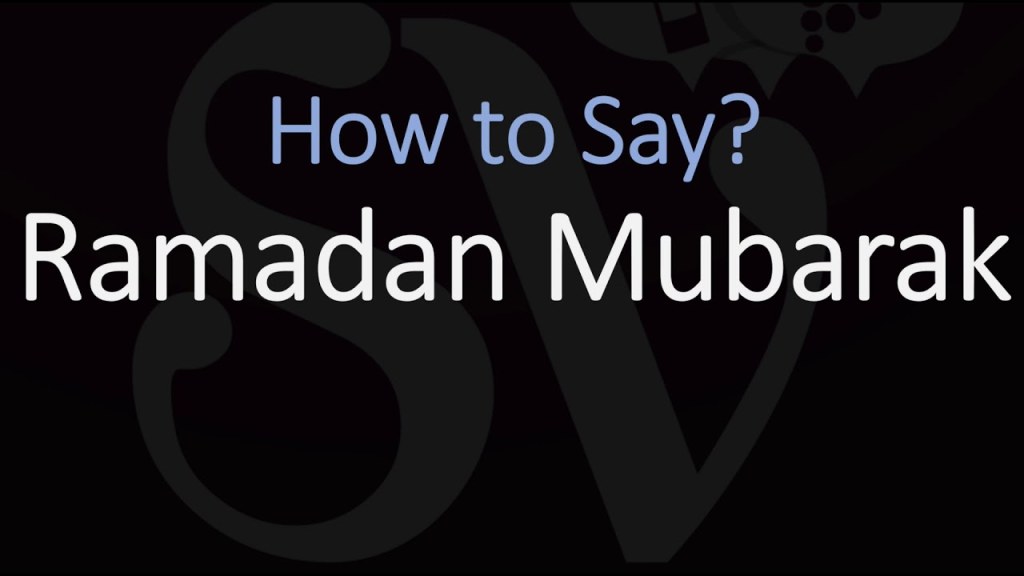Master The Art Of Pronouncing Ramadan Mubarak: Unlock The Spirit With A Single Click!
Pronounce Ramadan Mubarak: The Proper Way to Greet During Ramadan
Introduction
Greetings play an important role in every culture, and the Islamic holy month of Ramadan is no exception. During this sacred month, Muslims around the world greet each other with the phrase Ramadan Mubarak. But have you ever wondered how to properly pronounce it? In this article, we will explore the correct way to pronounce Ramadan Mubarak, its meaning, and its significance in the Muslim community. So, whether you are a Ramadhan enthusiast or a Ramadhan lover, let’s delve into the world of Ramadan greetings!
2 Picture Gallery: Master The Art Of Pronouncing Ramadan Mubarak: Unlock The Spirit With A Single Click!


What is Ramadan Mubarak?
Ramadan Mubarak is an Arabic phrase that translates to Blessed Ramadan in English. It is a common greeting used by Muslims to express well wishes, blessings, and good intentions during the holy month of Ramadan. The phrase is typically used to greet fellow Muslims and is often accompanied by acts of charity, prayer, and fasting.
Who Uses Ramadan Mubarak?

Image Source: ytimg.com
Ramadan Mubarak is predominantly used by Muslims worldwide. It is a greeting shared among family, friends, and members of the larger Muslim community. Both Arabic-speaking and non-Arabic-speaking Muslims embrace this greeting during Ramadan as a way to acknowledge and celebrate the holiness of the month.
When is Ramadan Mubarak Used?
The phrase Ramadan Mubarak is used exclusively during the Islamic month of Ramadan. Ramadan is the ninth month of the Islamic lunar calendar and is considered the holiest month for Muslims. It is during this time that Muslims observe fasting from dawn until sunset, engage in increased acts of worship, and strive to strengthen their relationship with Allah.
Where Does Ramadan Mubarak Originate?

Image Source: ytimg.com
The phrase Ramadan Mubarak originates from the Arabic language, which is the language of the Quran and the primary language of the Islamic faith. It is believed to have been used by the Prophet Muhammad, peace be upon him, and has since been passed down through generations as a traditional Ramadan greeting.
Why is Ramadan Mubarak Significant?
Ramadan Mubarak holds great significance in the Muslim community as it serves as a reminder of the blessings and spiritual opportunities that Ramadan brings. By using this greeting, Muslims express their joy and gratitude for the arrival of this sacred month, while also conveying their well wishes for others to have a blessed and fruitful Ramadan.
How to Pronounce Ramadan Mubarak Correctly?
Pronouncing Ramadan Mubarak correctly can be a challenge for non-Arabic speakers. To help you out, here is a breakdown of its pronunciation:
Ra- Pronounced like the letter R in English, but with a slight rolling sound at the beginning.
-mad- Pronounced like the word mad in English, with a soft a sound.
-an Pronounced like the word on in English, but with a soft a sound.
Mu- Pronounced like the word moo in English, but with a short u sound.
-bar- Pronounced like the word bar in English, with a soft a sound.
-ak Pronounced like the word uck in English, but with a short a sound.
When saying the phrase, remember to enunciate each syllable clearly and maintain a soft and melodious tone. Practice makes perfect, so don’t be afraid to ask native Arabic speakers for guidance!
Advantages and Disadvantages of Using Ramadan Mubarak
Like any other greeting, using Ramadan Mubarak has its pros and cons. Let’s explore them in detail:
Advantages/Pros
Universal Greeting: Ramadan Mubarak is widely recognized and understood by Muslims worldwide, making it a universal way to convey well wishes during Ramadan.
Expresses Solidarity: By using this greeting, Muslims show solidarity and a sense of unity, as they collectively celebrate the holy month of Ramadan.
Spreads Positivity: Ramadan Mubarak carries a positive and uplifting message, fostering an atmosphere of joy, blessings, and goodwill.
Encourages Reflection: The greeting serves as a reminder for Muslims to reflect on their faith, engage in self-improvement, and strive for spiritual growth during Ramadan.
Strengthens Bonds: Sharing the greeting creates an opportunity to connect with fellow Muslims, strengthen relationships, and foster a sense of community.
Disadvantages/Cons
Language Barrier: Pronouncing Ramadan Mubarak correctly can be challenging for non-Arabic speakers, leading to potential mispronunciations or misunderstandings.
Cultural Appropriation: Some individuals may use the greeting without fully understanding its cultural and religious significance, leading to the risk of cultural appropriation.
Frequently Asked Questions (FAQs)
1. Is Ramadan Mubarak only used by Muslims?
Yes, Ramadan Mubarak is primarily used by Muslims as a way to greet and express well wishes during the holy month of Ramadan.
2. Can I use Ramadan Mubarak if I’m not Muslim?
While non-Muslims can appreciate and acknowledge the significance of Ramadan, it is important to be respectful and mindful when using Ramadan Mubarak as a greeting. It is best to use greetings that are more culturally appropriate.
3. Are there any alternative greetings for Ramadan?
Yes, there are alternative greetings for Ramadan, such as Ramadan Kareem which translates to Generous Ramadan in English. This greeting is also widely used and accepted among Muslims.
4. Can I use Ramadan Mubarak throughout the entire month of Ramadan?
Yes, Ramadan Mubarak can be used throughout the entire month of Ramadan as a way to convey well wishes and blessings to fellow Muslims.
5. How do I respond to someone who greets me with Ramadan Mubarak?
A common response to Ramadan Mubarak is Thank you, Ramadan Mubarak to you too! This reciprocates the good wishes and acknowledges the significance of the greeting.
Conclusion
In conclusion, understanding the proper pronunciation and meaning of Ramadan Mubarak allows us to participate in the joy and blessings of Ramadan. By using this greeting, we can express our well wishes and connect with the global Muslim community during this sacred month. So, let’s embrace the spirit of Ramadan and greet each other with a heartfelt Ramadan Mubarak!
Final Remarks
As we conclude this article, it is important to note that cultural sensitivity and respect are crucial when engaging in intercultural exchanges. While it is fascinating to learn about different traditions and greetings, it is equally important to approach them with understanding and appreciation. By doing so, we foster an environment of inclusivity and bridge the gaps between cultures. May this knowledge serve as a stepping stone towards fostering unity and promoting intercultural harmony. Ramadan Mubarak!
This post topic: Ramadhan


